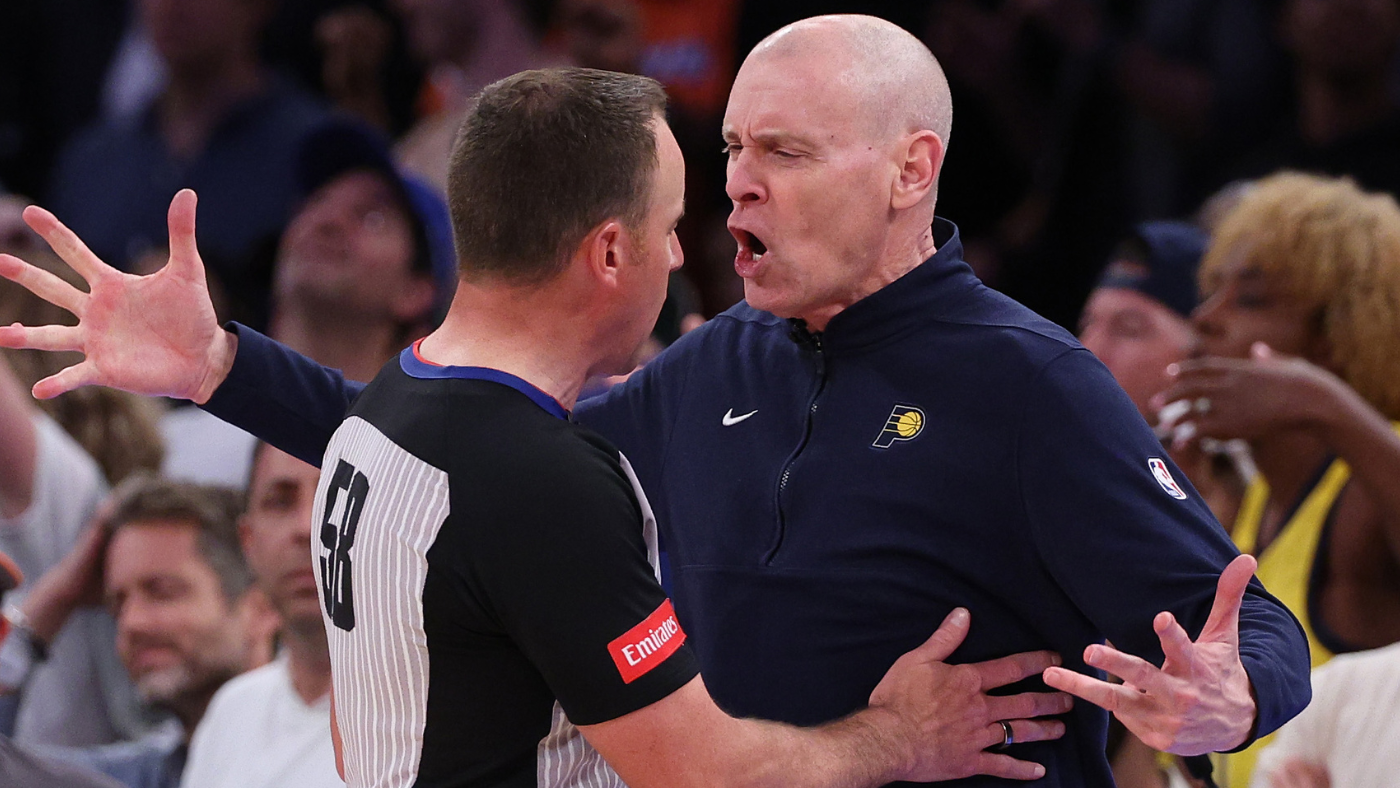
The New York Knicks have been at the center of several officiating controversies so far this postseason. They won Game 2 of their first-round series against the Philadelphia 76ers because the officials incorrectly chose not to call a foul on Josh Hart as he stole the ball from Tyrese Maxey during a critical game-saving possession. That injustice was balanced in Game 5, when the Knicks lost in large part because Maxey was not called for a travel that the league later determined he committed as he made a game-changing 3-pointer.
But so far in New York’s second-round series against the Indiana Pacers, just about every controversial call has been in favor of the Knicks. Game 1 was littered with them. There was a kicked ball violation that saved a Knicks possession even though the ball was shown not to have been kicked upon replay. As kicked balls are not reviewable, there was nothing the officials could do to rectify that mistake. Then, with 12.7 seconds remaining, the Pacers had a chance to win with the ball down one. However, Myles Turner was called for an illegal screen that cost Indiana that chance. Review showed that it was indeed an illegal screen, but those calls are rarely made at the end of close playoff games.
This time, however, the whistle did not swing in Indiana’s direction. The Pacers were similarly incensed by the officiating in Game 2. In fact, head coach Rick Carlisle even got ejected for complaining with 33.2 seconds remaining. After the loss, which gave the Knicks a 2-0 series lead, Carlisle unloaded on the officiating and implied the referees have a bias against a small-market team like Indiana.
To begin, though, Carlisle claimed that the officials missed 29 calls in Game 1.
“We always go through the film in games where it felt like the whistles weren’t balanced, and we pull the clips, and there’s a way you can submit them to the NBA office,” Carlisle explained. “In the playoffs when you submit things, the other team sees what you submit. And so, there were 29 plays in Game 1 that we thought were clearly called the wrong way. I decided not to submit them because I just felt like, you know, we’d get a more balanced whistle tonight. It didn’t feel that way.”
Such reports are a somewhat common part of the postseason. The 76ers, for instance, submitted one after Game 2 of their series against the Knicks. Whether they actually affect officiating in future games is hard to gauge, but Carlisle came into his postgame press conference on Wednesday with examples of what he believed were missed calls.
“A couple of examples. With 5:08 in the third, the whole world knows that [Tyrese] Haliburton’s got a bad back. And Hart comes up and shoves him in the back. It’s all over Twitter right now because a few people have showed it to me. JB DeRosa is looking right at it, you can see, he’s got vision of the play and he shoves Tyrese into the corner, and there’s no whistle. Right in the back. That was shocking, and there were many others. I can promise you that we’re gonna submit these tonight. New York can get ready, they’ll see them too,” Carlisle said.
Here is the play in question:
Hart does not get whistled for a foul on the play. In the fourth quarter, there was another moment that Carlisle cited in his press conference. With 1:19 remaining, Isaiah Hartenstein got called for a double dribble as he attempted to bring the ball up court. Knicks coach Tom Thibodeau expressed frustration at the call, and the officials eventually determined that it was an inadvertent whistle. The Knicks were allowed to retain possession.
“One guy just said he didn’t double-dribble. But it looked to me like, you know, Thibs went out and argued it and they changed it. That’s what it looked like. I can only go by what I see, what I saw, and, you know, that’s small beans compared to everything else. Small-market teams deserve an equal shot. They deserve a fair shot no matter where they’re playing,” Carlisle said in his most scathing quote of the night.
For what it’s worth, Pacers guard T.J. McConnell said the refs having a bias against Indiana is “not the feeling that we have in the locker room.” McConnell added that the Pacers “gotta be better.”
For the series, the Knicks have attempted 12 more free throws than the Pacers. During the regular season, the Knicks averaged 1.3 more free-throw attempts per game than the Pacers did. However, the Pacers committed 3.8 more total fouls per game than the Knicks did. All in all, you’d expect a free-throw advantage for New York in this series, though perhaps not as stark as it has been.
The totality of the calls are one thing. The specific, controversial moments are another. Both Game 1 and Game 2 have included several questionable calls in critical moments. Whether or not those calls ultimately determined the outcome is subjective, but Carlisle is doing everything in his power to prevent officiating decisions from defining the rest of the series.






